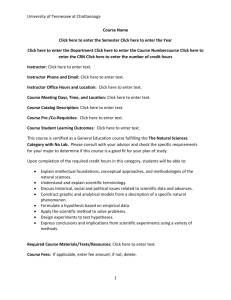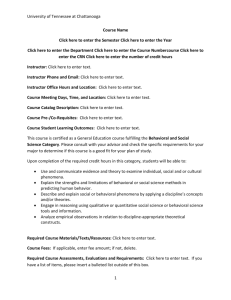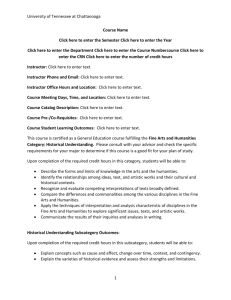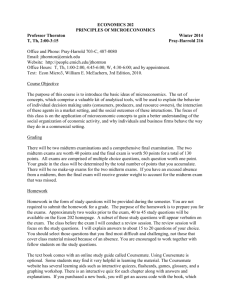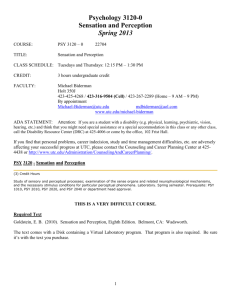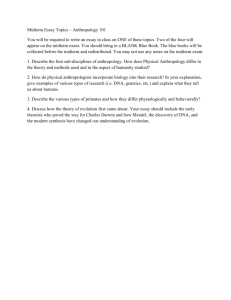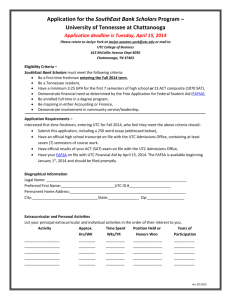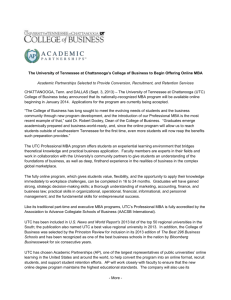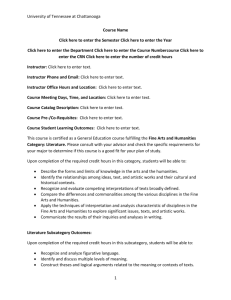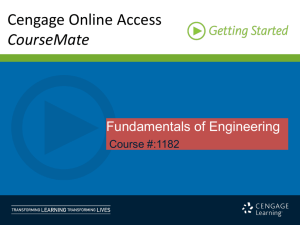The University of Tennessee at Chattanooga 1 Sensation and
advertisement
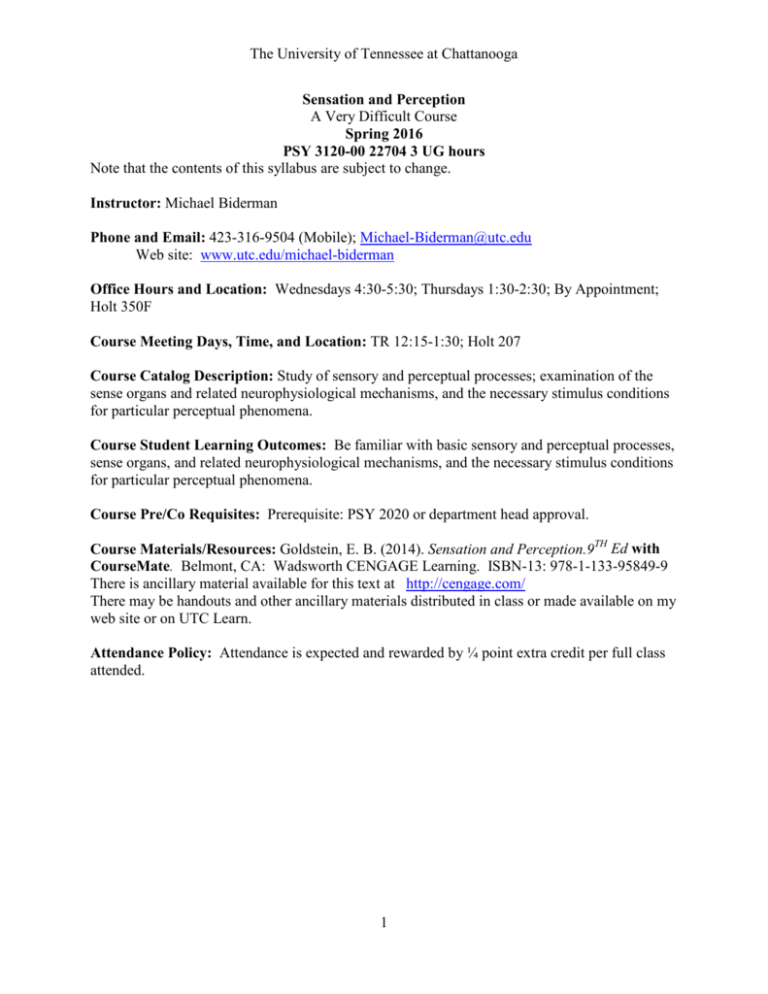
The University of Tennessee at Chattanooga Sensation and Perception A Very Difficult Course Spring 2016 PSY 3120-00 22704 3 UG hours Note that the contents of this syllabus are subject to change. Instructor: Michael Biderman Phone and Email: 423-316-9504 (Mobile); Michael-Biderman@utc.edu Web site: www.utc.edu/michael-biderman Office Hours and Location: Wednesdays 4:30-5:30; Thursdays 1:30-2:30; By Appointment; Holt 350F Course Meeting Days, Time, and Location: TR 12:15-1:30; Holt 207 Course Catalog Description: Study of sensory and perceptual processes; examination of the sense organs and related neurophysiological mechanisms, and the necessary stimulus conditions for particular perceptual phenomena. Course Student Learning Outcomes: Be familiar with basic sensory and perceptual processes, sense organs, and related neurophysiological mechanisms, and the necessary stimulus conditions for particular perceptual phenomena. Course Pre/Co Requisites: Prerequisite: PSY 2020 or department head approval. Course Materials/Resources: Goldstein, E. B. (2014). Sensation and Perception.9TH Ed with CourseMate. Belmont, CA: Wadsworth CENGAGE Learning. ISBN-13: 978-1-133-95849-9 There is ancillary material available for this text at http://cengage.com/ There may be handouts and other ancillary materials distributed in class or made available on my web site or on UTC Learn. Attendance Policy: Attendance is expected and rewarded by ¼ point extra credit per full class attended. 1 The University of Tennessee at Chattanooga Course Calendar/Schedule: Schedule of Topics Day 1/12 1/14 1/19 1/21 1/26 1/28 2/2 2/4 2/9 2/11 2/16 2/18 2/23 2/25 3/1 3/3 3/8 3/10 3/15 3/17 3/22 3/24 3/29 3/31 4/5 4/7 4/12 4/14 4/19 4/21 4/28 Syllabus Chapter 1: Introduction to course. Introduction to Perception. 19 pages. Chapter 2: The Beginnings of Perception. 33 pages. Chapter 3: Neural Processing and Perception. 24 pages. Chapter 4: Cortical Organization. 18 pages. Test 1 Chapter 5: About 50 pt. About 42 MC questions + 3 short answer essays. Perceiving Objects and Scenes. 32 pages. Chapter 8: Perceiving Motion. 22 pages. Chapter 9: Perceiving Color. 24 pages Spring Break Spring Break Chapter 10: Perceiving Depth and Size. 32 pages. Test 2 Chapter 11: About 50 pt. About 42 MC questions + 3 short answer essays. Hearing. 28 pages. Chapter 12: Auditory Localization and Organization. 28 pages. Chapter 13: Speech Perception. 18 pages. Final Exam. About 60 points. 52+ MC questions + 3 short answer essays. Midterm level covergage of material since the last test. A few of the final exam questions will be comprehensive Each multiple choice question will be worth 1 point. Each essay question will be worth 4 points. On each test, you will be required to answer two essay questions. You may answer the 3rd essay question for extra credit. 2 The University of Tennessee at Chattanooga Chapter Tests. A 10- question multiple-choice test over the text will be given as close as possible to the first day scheduled for coverage of each chapter or topic. Each chapter test question will be worth ½ point. Each test will be given at the beginning of the period and should take no more than 5 minutes. One of the chapter tests will have 0 points required. This means that if you take all the chapter tests you’ll be able to make up to 5 points more than required. You may make up two chapter tests with no questions asked as long as you do it before the corrected tests are returned. After two late minitests, 1 point per school day will be deducted from your score. This means you should make every effort to take the chapter tests on the scheduled day, saving makeups for true emergencies such as sickness, traffic accidents, car breakdowns, etc. If you know you’ll miss a class but want to take the chapter test to be given in that class, make arrangements with me to take the test before the class. 423-316-9504. CourseMate. Enrollment in CourseMate, the online system provided with this course is required. Participation in CourseMate will be worth up to 15 points based on scores earned on CourseMate tests and time spent on CourseMate projects. Grading Scale: A: 90-100% B: 80-89.99% C: 65-79.99% D: 50-64.99% F: 0-49.99% Policy for Late/Missing Work: See above for the policy regarding chapter tests. Midterm tests must be made up before graded tests are returned to the class. Course Assessments and Requirements: Requirement 1st Midterm 2nd Midterm Final exam Chapter Tests CourseMate Total – about Approximate worth 50 50 60 50 (Although you can earn up to 5 more points than this) 15 225 3 The University of Tennessee at Chattanooga Extra Credit: Ways to earn extra credit are listed below. No more than 10 of these extra credit points may be applied toward your grade. Participate in a psychology experiment using the Sona system 1 pt per ½ hour. During the course of the semester, opportunity to participate in experiments and other learning opportunities through the UTC Sona Research Management System may arise. If so, you may earn credit for participating in such projects. Record a chapter of the text. 2 pt / Chapter 4 pt. max. Make an audio recording of a chapter from the text. Such a recording could be used by visually handicapped students, students taking long trips, etc. (The reading might help you better understand the material.) Check with me before proceeding. Describe 2 practical applications of S & P. 2 pt. max. Describe two practical applications of the information presented in Psychology 312. Submit a one-paragraph typewritten summary of each application. Example: Write a paper describing how the design of stereo equipment uses information on the limits of human audibility, the relationship of loudness to frequency, and the binocular cues for auditory localization. Report on an internet site related to S & P 1 pt. / report; 2 pt. max. Find a web page devoted to Sensation and Perception. Write a 1-2 page report on the site, including its address and printouts of what is displayed on the site, a critical appraisal of its quality and usefulness for the course. Other Extra Credit. Other opportunities for extra credit may present themselves during the semester. See me before committing to one. All extra credit must be submitted before the end of the last day of class – The semester ends at the end of the final exam period. No credit will be given for anything submitted after the end of the final exam. 4 The University of Tennessee at Chattanooga 1) Anonymity. All test essay questions are graded anonymously. To prevent my knowing whose test I’m grading from the color of the ink, you must write all essay questions using a black or regular blue pen. Do not put your name on any essay question response. ½ point will be deducted for each appearance of your name on the test in any place other than the “Name” field on the front of the test and on your multiple choice answer sheet. 2) Handwriting. If I can’t read your written responses to essay questions, points will be deducted from the score assigned to the response. 3) Missed midterm tests. If you miss a midterm test, it is possible that you will be allowed to make it up, but you must contact me as soon as possible to explain why the test was missed and why you should be allowed to make it up. Make-up tests may not be identical to the test given during the regular time period. 4) Electronic Equipment in class. The use of cell phones or other electronic devices, including headphones/earbuds is prohibited during class and during tests. Please turn your cell phone off or to “vibrate” mode at the beginning of class. Remind me to do the same with mine. Computers or tablets may be used only for note-taking. No cell phones may be used for note taking. You must check with me before using a computer or tablet. 5) Food. Eating food or drink is prohibited during class and tests. Having said that, I won’t keep you from surreptitiously snacking for a short time at the beginning or near the end of class as long as it doesn’t disrupt me or the class. 6) Reporting grades. I will use UTC Learn (sometimes called Blackboard) to report grades and for general communication with the class. You should log onto UTC Learn as soon as is convenient. 7) Phone calls. I don’t mind phone calls from students. If you call, please give your full name and a specific statement of what you want. If you get my voice mail, leave your full name, number and time at which you can be reached, and a specific statement of what you want. I don’t necessarily respond to phone messages left without name or purpose of the call. My cell number is 423-316-9504. 8) Emails. The best way to reach me is through email. My UTC email address is MichaelBiderman@utc.edu Because I use gmail, I have all my emails forwarded to my gmail account. My response will be from my gmail account, mdbiderman@gmail.com Since I spend most of my time at my computer, the best way to communicate with me is via email. Please give your name in the body of your email. I don’t necessarily respond to unsigned emails. 9) Lecture Recordings. I will attempt to record all my lectures and put the recordings on my web site, www.utc.edu/Michael-Biderman The recordings will be in mp4 format. It’s my understanding that Macintosh computers will play them. Because there is not enough server space on the UTC web site to store a whole semester’s worth of lectures, I try to leave each lecture up for about a week. You can view them online or download them to your computer for viewing at a later time. 10) Lecture Notes. My lecture notes for each topic are also on my web site as Word documents. I encourage you to print them off and bring them to class with you or download them to your computer. That will be much easier than trying to copy down everything I say. I will not read my lecture notes. Instead, I will use them as talking points. But I believe that the gist of what I will say is in the notes. The information in the notes will sometimes be quite similar to what is presented in the text, but it will sometimes expand upon what is presented in the text. The material in my lecture notes will have the greatest likelihood of being on the midterm exams. 5
